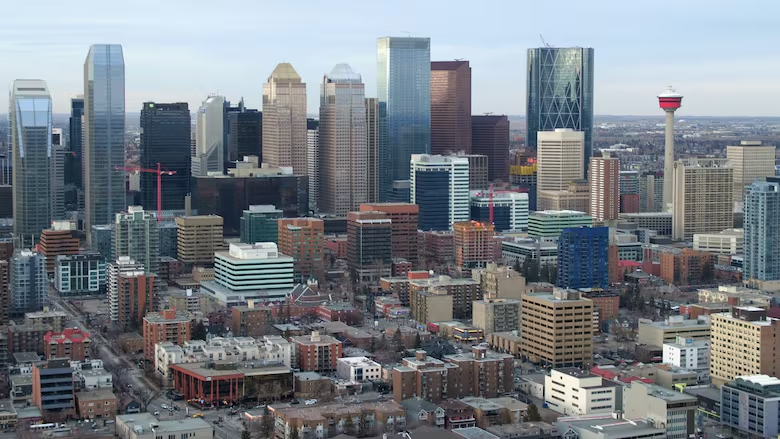Here's how Budget 2020 will fund Calgary projects like flood mitigation and affordable housing
Alberta government announced details of Budget 2020 on Thursday

The latest Alberta budget contains a number of new fees and announcements that will have an impact on your bottom line — and simultaneously change the trajectory of dozens of big ticket Calgary projects and developments.
Here are some of the specific changes announced as part of Budget 2020 that will have an impact on projects and construction underway in Calgary.
Affordable housing
A cut to maintenance for affordable housing units in Alberta may result in Calgary closing some buildings, Mayor Naheed Nenshi said.
The province plans to cut $53 million from housing maintenance in Alberta over the next three years, according to the budget — something the mayor called a big surprise that will hurt vulnerable people.
We're going to have to close affordable housing units.- Calgary Mayor Naheed Nenshi
"We are in a position where if someone moves on out of affordable housing, we can't give their unit to someone else, because it doesn't meet basic life requirements and that's what the money that got cut," Nenshi said. "So without question, this means we're going to have to close affordable housing units."
Nenshi said that the city currently needs approximately 15,000 more affordable housing units, and the new budget means the city may need to "close entire buildings."
"We're going to do everything we can to keep people safe and in their homes, and I don't want to make it a pure arithmetical game, but we're talking about a lot of units," Nenshi said.
Flood mitigation
The province plans on investing $15 million over the next three years to fund a study on a multi-use dam to help with flood mitigation on the Bow River.
"[That was] one piece of good news," Nenshi said. "That will help us accelerate the work to protect the city from flooding on the Bow River."

Year one of the study will involve $2 million for stakeholder and First Nation engagement, site and geotechnical investigation, and a drilling program.
The province is waiting for federal approval for the Springbank off-stream diversion project. In the next fiscal year, it expects to spend nearly $28 million on that project.
Deerfoot Trail
The budget includes plans to provide $4 million by the end of 2021 for upgrades to Deerfoot Trail, with an intention to spend $110 million over the next three years on the project in an attempt to eliminate bottlenecks.
The province said it plans to consider the project under what's known as a public-private partnership (or P3), infrastructure projects that involve collaboration between government agencies and private-sector companies.
Deerfoot Trail is the busiest road in the province — parts of the road see up to 170,000 vehicles each day.
Calgary ring road
Nearly half a billion dollars will be spent on Calgary's ring road project in the next year to continue construction on the southwest and west portions.
The 21-kilometre southwest ring road, anticipated to cost $1.4-billion, is set to open in October 2021, while the $1-billion west ring road is scheduled to open in 2022.
LRT projects
Anyone hoping for a short-term reprieve for Calgary's Green Line didn't find it in Budget 2020, as there were no changes in the province's immediate plans to fund light rail transit.
Grants to municipalities will also remain the same for the next three years.

The future of the Green Line project was met with uncertainty after last year's provincial budget, when just 14 per cent of expected funding was provided. The other 86 per cent was deferred to the back half of the pre-existing eight year funding agreement.
Since then, the city has sought to make changes to the project, staying within its allotted budget while still attempting to deliver on its goals.
Facility funding
The government is continuing to spend on the Calgary Cancer Centre, committing to provide $802 million to the facility over the next three years. The $1.4-billion research and treatment centre is expected to open in 2023.
Budget 2020 also commits $20 million over three years for the expansion of Vivo for Healthier Generations in north Calgary.
The budget also cuts operating grants to the Calgary Stampede by $1 million from last year, taking it down to $4.5 million this year.
Additional changes
North of Calgary, the Red Deer Integrated Emergency Shelter saw a commitment of $7 million in 2020, which is intended to expand the existing facility by 160 new spaces for homeless Albertans.
The Red Deer Justice Centre is expected to receive $157 million in the next three years.
The Red Deer Regional Hospital expansion, announced on Wednesday, will receive $25 million over three years and will receive part of the $6 million earmarked for health facility project planning.
Clarifications
- A previous version of this story noted that 86 per cent of funding was cut in Budget 2019 for the Green Line. That funding was deferred to the back half of the pre-existing eight-year funding agreement.Mar 01, 2020 3:23 PM EST
With files from Scott Dippel and Rachel Maclean